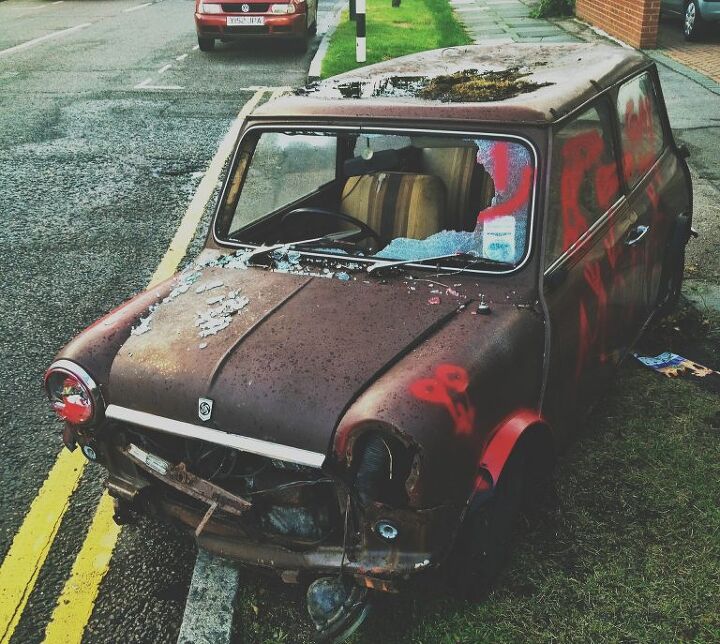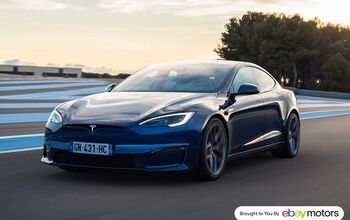Brexit Seems to Have Really Screwed Up Britain's Car Market

While some of Europe saw modest auto sale gains through the first nine months of 2017, the region has mirrored North America’s decline in deliveries since the end of the summer. The United States saw eight consecutive months of declining sales this year, with a positive bump in September and better than expected volume in Canada.
Europe, meanwhile, saw the inverse. Passenger car registrations fell 2 percent year-over-year to roughly 1.43 million deliveries in September, despite August seeing a 5.6-percent improvement. Overall, 2017 has the makings of a unsatisfactory sales year for both regions. But Europe seemed to be doing alright before the U.K. suddenly stopped buying cars.
British registrations took a massive nosedive after Brexit. By September, it represented a monthly decline of 9.3 percent, compared to Germany’s 3.3 percent slide. Even though the rest of the continent saw a gain in sales, having Europe’s two largest markets lagging guaranteed the net loss.
The U.K.’s decline represent sixth straight months of dwindling deliveries. Bloomberg attributes the fumble to a weak pound and unsuccessful Brexit negotiations. In fact, trade deals have been idled since the British Chambers of Commerce downgraded its medium-term economic growth outlook in early September.
Still, we shouldn’t attribute Britain’s lackluster sales performance entirely to Brexit. Shorter average commuter times within the United Kingdom have made ride-hailing apps like Uber and Lyft exceedingly popular. The relatively recent PCP car loan trend also appears to have plateaued and analysts are becoming fearful that it has created a dangerous bubble within the automotive industry — akin to what took place in the housing market during the Great Recession. British household indebtedness is also already extremely high and average household savings is virtually nonexistent.
Combine that with governmental promises that internal combustion vehicles will be banned by 2040, fairly high auto taxation rates (compared to the U.S.), a market hampered by right-hand drive models that cannot be sold in other parts of Europe while also leaving consumers with fewer options, and the United Kingdom doesn’t really look like the greatest place to own a car.
While other countries have promised similar regulatory measures and already implement fairly aggressive taxes on automobile ownership, the U.K. seems to be the one suffering the most. As a result, PSA Group said on Monday it has decided to eliminate 400 jobs at Vauxhall’s Ellesmere Port facility in Britain to cope with declining sales.
Of course, Vauxhall has problems that extend beyond the U.K. But the region’s sales slump is hurting other automakers popular among British consumers. New vehicle deliveries from Ford Motor Co., the U.K.’s best-selling brand, fell 13 points across Europe last month.
For the whole of the year, U.K. sales down 3.9 percent against 2016’s figures through September. The most noticeable gap comes from diesel sales. According to SMMT vehicle registration data, diesel-powered vehicles saw 21.7 percent fewer deliveries in September and a 13.7-point loss for the year so far.
No other segment has bothered to fill that void. Sales for all vehicle types are down within Britain this year. The only exception is alternative fuel vehicles — which saw massive gains in 2017. Sadly, that 4.6-percent market share isn’t growing fast enough patch the gaping hole left by internal combustion models.

A staunch consumer advocate tracking industry trends and regulation. Before joining TTAC, Matt spent a decade working for marketing and research firms based in NYC. Clients included several of the world’s largest automakers, global tire brands, and aftermarket part suppliers. Dissatisfied with the corporate world and resentful of having to wear suits everyday, he pivoted to writing about cars. Since then, that man has become an ardent supporter of the right-to-repair movement, been interviewed on the auto industry by national radio broadcasts, driven more rental cars than anyone ever should, participated in amateur rallying events, and received the requisite minimum training as sanctioned by the SCCA. Handy with a wrench, Matt grew up surrounded by Detroit auto workers and managed to get a pizza delivery job before he was legally eligible. He later found himself driving box trucks through Manhattan, guaranteeing future sympathy for actual truckers. He continues to conduct research pertaining to the automotive sector as an independent contractor and has since moved back to his native Michigan, closer to where the cars are born. A contrarian, Matt claims to prefer understeer — stating that front and all-wheel drive vehicles cater best to his driving style.
More by Matt Posky
Latest Car Reviews
Read moreLatest Product Reviews
Read moreRecent Comments
- Lorenzo People don't want EVs, they want inexpensive vehicles. EVs are not that. To paraphrase the philosopher Yogi Berra: If people don't wanna buy 'em, how you gonna stop 'em?
- Ras815 Ok, you weren't kidding. That rear pillar window trick is freakin' awesome. Even in 2024.
- Probert Captions, pleeeeeeze.
- ToolGuy Companies that don't have plans in place for significant EV capacity by this timeframe (2028) are going to be left behind.
- Tassos Isn't this just a Golf Wagon with better styling and interior?I still cannot get used to the fact how worthless the $ has become compared to even 8 years ago, when I was able to buy far superior and more powerful cars than this little POS for.... 1/3rd less, both from a dealer, as good as new, and with free warranties. Oh, and they were not 15 year olds like this geezer, but 8 and 9 year olds instead.


































Comments
Join the conversation
Brexit. The worse populist decision by any politican this Century. Putting aside, stagnant incomes, mixed with a depreciating currency, along with the expected inflationary pressures, the UK's auto manufacturer's are facing a declining export market. The EU is the UK's biggest market by far and it will shrink substantially. This doesn't factor in the declining financial sector that will move offshore. The Brexit supporters deserve ehat's coming yheir way, just like the supporters of the dismantling of NAFTA.
"a market hampered by right-hand drive models that cannot be sold in other parts of Europe while also leaving consumers with fewer options" I truly can't comprehend why there are still countries that stick to driving on the left. Back in the 1960's-70's when several countries switched to driving on the right, ALL of them should have done so. Right-hand-drive is unnatural. I realize this opinion is going to stir up a lot of hate from those who think driving on the left is better. So be it...